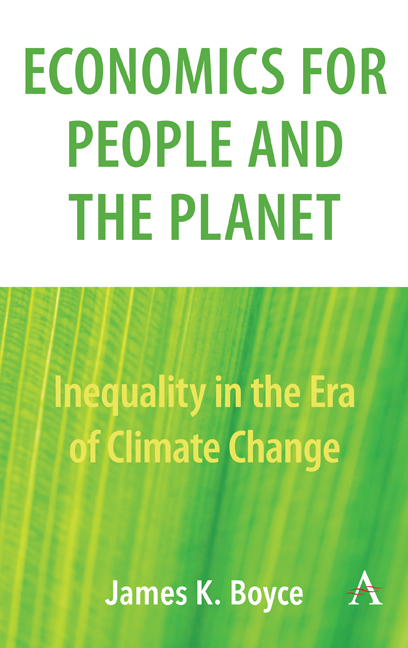Book contents
- Frontmatter
- Contents
- List of Illustrations
- Acknowledgements
- Part I Rethinking Economics and the Environment
- Chapter 1 Limits to Growth–of What?
- Chapter 2 The Twin Tragedies of Open Access
- Chapter 3 Pursuing Profits–or Power?
- Chapter 4 Rent in a Warming World
- Chapter 5 Universal Assets for Universal Income
- Chapter 6 Universal Basic Income: Six Questions
- Chapter 7 Environmentalism's Original Sin
- Chapter 8 Rethinking Extinction
- Part II Environmental Injustice
- Part III Climate Policy
- Notes
- Publication History
- Index
Chapter 4 - Rent in a Warming World
from Part I - Rethinking Economics and the Environment
Published online by Cambridge University Press: 12 February 2019
- Frontmatter
- Contents
- List of Illustrations
- Acknowledgements
- Part I Rethinking Economics and the Environment
- Chapter 1 Limits to Growth–of What?
- Chapter 2 The Twin Tragedies of Open Access
- Chapter 3 Pursuing Profits–or Power?
- Chapter 4 Rent in a Warming World
- Chapter 5 Universal Assets for Universal Income
- Chapter 6 Universal Basic Income: Six Questions
- Chapter 7 Environmentalism's Original Sin
- Chapter 8 Rethinking Extinction
- Part II Environmental Injustice
- Part III Climate Policy
- Notes
- Publication History
- Index
Summary
To combat climate change, we need to shift from extractive rent to protective rent.
What's rent got to do with climate change? More than you might think.
Rent isn't just the monthly check that a tenant writes to her landlord. Economists use the term ‘rent seeking’ to mean using political and economic power to get a larger share of the national pie, rather than to grow the pie. In the United States, Nobel laureate Joseph Stiglitz observes, such dysfunctional activity has metastasized alongside deepening inequality.
When rent inspires investment in useful things like housing, it's productive. The economic pie grows, and the society gets something in return. When rent leads to investment in unproductive activities, like lobbying to capture wealth without creating it, it's parasitic. The society gets nothing in return.
Two other types of rent originate in nature rather than investment. Extractive rent comes from nature as a source of raw materials. The difference between the selling price of crude oil and the cost of pumping it from the ground is an example.
Protective rent comes from charging for the use of nature as a sink for our wastes. In the northeastern states of the United States, for example, the Regional Greenhouse Gas Initiative requires power plants to buy carbon permits at quarterly auctions. In this way, power companies pay rent to park carbon dioxide emissions in the atmosphere. Similarly, pollution taxes now account for more than 5 per cent of government revenue in some European countries. When polluters pay to use nature's sinks, they use them less than when they're free, helping to prevent their overuse and abuse.
Extractive and protective rents both originate in nature, but they differ sharply in that one promotes resource depletion, the other conservation. The tension between these two types of rent from nature is increasingly evident in our warming world.
A daunting obstacle to climate policy arises from the vested interests of fossil fuel corporations in continuing to reap extractive rent. The value of the world's oil, coal and natural gas reserves has been estimated at $27 trillion.
Much of this will have to be written off if we phase out fossil fuels. ‘You can have a healthy fossil-fuel balance sheet, or a relatively healthy planet,’ Bill McKibben observes. ‘You can't have both.
- Type
- Chapter
- Information
- Economics for People and the PlanetInequality in the Era of Climate Change, pp. 13 - 16Publisher: Anthem PressPrint publication year: 2019



